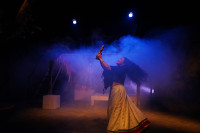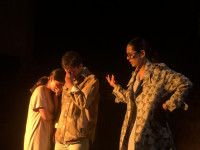Theater
Where women openly talk about vaginas
TVM Alumni is all set to stage the fifth iteration of The Vagina Monologues.
Srizu Bajracharya
A room full of women talking about their vaginas unabashedly sounds empowering. For the sole reason, that discussions around vaginas or female sexuality are hushed in daily conversations in our society. The topic is considered offensive to the public, a taboo that must never be talked about in open, or in confidence. And that is the very idea that The Vagina Monologues, the episodic play written by Eve Ensler, wants to dispel.
“In 2015, when I joined my first Vagina Monologues workshop, I was asked to make a drawing of my vagina. But I never had, with conscious intention, looked at my vagina,” says Seitu Hada, one of the six performers of this year’s play, organised by the TVM (The Vagina Monologues) Alumni. “The task felt uncomfortable.”
The vagina is where all the insecurities, violence and oppression starts for a woman, say the performers, in a room where they have been holding discussions and practising their lines for the drama set to be staged from Saturday. “We never talk about our vagina or think about it, although it’s the most powerful and vulnerable part of the body,” says Hada. But now, as she prepares for her fifth performance on stage, she feels empowered to bring forward women narratives.
The monologues they will be performing will talk about various women issues, such as their first menstrual cycle, menstruation, sex, birthing, body image, orgasm, and menopause. It will also bring to the fore cases of abuse and violence. Owing to the discussions held at the event, over the years, these monologues have taken the form of activism in Nepali society as well.
The original The Vagina Monologues, however, is an English play that is limited to exploring the experiences of women only from the West. “We understand the limitations of performing in English, but the scripts are not unfamiliar to the women of our country,” says Preet Shah, who is one of the producers of TVM 2020. “The experiences and the issues we bring up in our monologues is something everyone will relate too.”
The group says it has also been discussing and collecting stories of Nepali women, besides working on the current project to make a Nepali adaptation of The Vagina Monologues.
Last year, Katha Ghera, a theatre group, had also performed a Nepali rendition of The Vagina Monologues, Private is Political. The play discussed stories of harassment and personal stories of the performers themselves. It was well-received by the audience and addressed issues of oppression women face. And because the #Metoo movement was just unravelling in the Capital, the stories resonated deeply with the audience.
The performers of TVM Alumni, unlike the team of Katha Ghera, are not trained actors, rather a collective of women who want to be part of the global activism to end violence against women. And although they have been organising the play every year (except 2019) the group understands that their activism to address issues of women is still a slow undertaking that requires time and effort.
“We think of change as something that should happen just like that, but what I see as a cascading effect of The Vagina Monologues, is that those who have participated in the play have gone on to pass on their experience to others, through which new people are joining and exploring themselves. The process has expanded on the activism slowly and steadily and that too makes a difference,” says Madhurima Bhadra, who is also a producer leading TVM 2020.
During shows, however, many people have been stunned by the repetitive use of words like sex, vagina, and sounds of sexual moanings. Many in between the shows have also got up to leave the theatre, say organisers. “If you come to see the play just as a play, people are going to be shocked because it’s not a pleasant experience when we are talking about violence and abuse. Sometimes it might get uncomfortable for the people watching, as what we perform is very emotional,” says Shah.
But many people have identified with their stage performances because of their personal experiences, they say. And that has made their narratives powerful, which is why The Vagina Monologues over the years has gained more recognition in the Capital.
Since starting in 2015, the group has seen how people have become more accepting of the idea behind The Vagina Monologues. Moreover, their works have influenced conversations around sexuality, women violence, body image, menstruation and reproduction while breaking and questioning the patriarchal setting both inside and outside of rehearsals and staged performances.
Even for the women who have participated in the performances, they say they have seen a change in themselves from how they see their vaginas to how empowered they feel to vocalise their thoughts. “There was a time when it was even uncomfortable for me to ask for a sanitary pad, and I realise now why we felt ashamed about something so natural,” says Shristi Kunwar, one of the younger participants.
The organisers also believe the younger generation has been more open to the discussion that they want to see in society. According to the team, the younger generation is interested in discussing sexuality and are open to gender fluidity and it is they who have supported their shows.
“The young generation is more vocal about the issues we want to address and they are the ones who are really looking forward to seeing the show this year,” says Shah. “And this is what will take the activism forward and make a safe environment where people will not shy away from talking about our issues.”
The Vagina Monologues will be staged on February 22 in Shilpee Theatre at 1pm and 5 pm, and on February 23 in Yala Maya Kendra at 2pm.




 9.89°C Kathmandu
9.89°C Kathmandu










